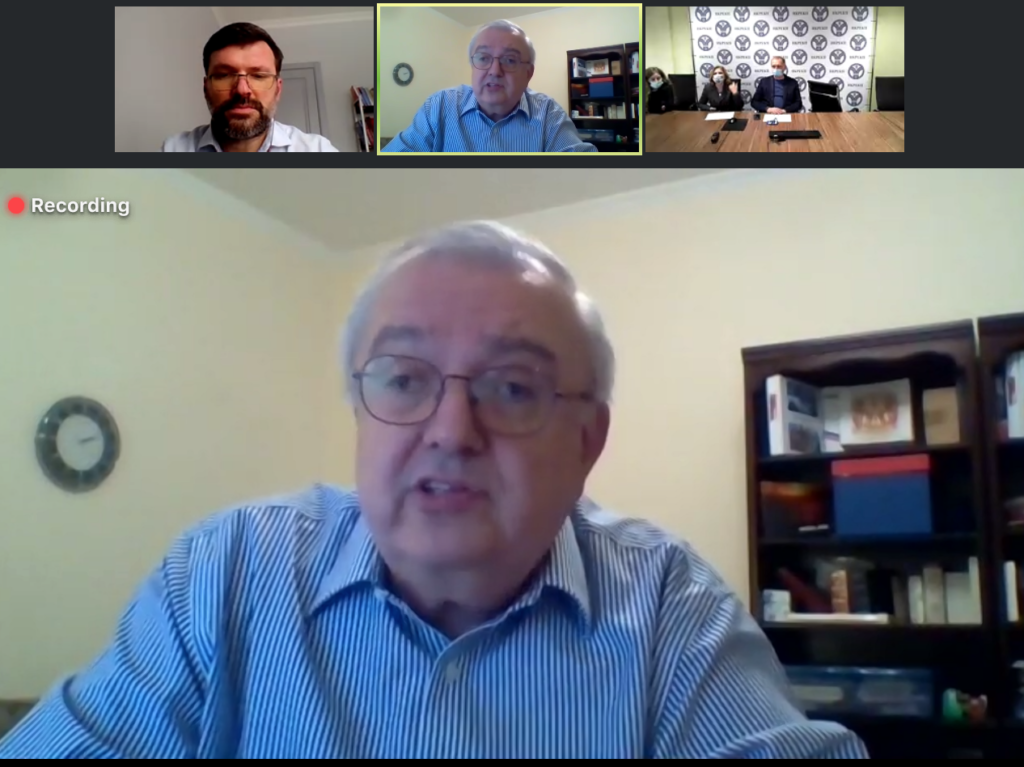At the workshop on the best European practices to ensure the integrity and transparency of energy markets, organized by the USAID Energy Security Project on February 11, 2021, the experts presented the experience of market surveillance and monitoring both on a practical example of the national regulatory authority in the United Kingdom and through a general overview of best practices across the EU and discussed the challenges, features, limitations, and lessons with regard to intended implementation in Ukraine of the EU Regulation on Wholesale Energy Markets Integrity and Transparency (REMIT).
The workshop was opened by Sukru Bogut, USAID Ukraine Senior Energy Advisor, who noted that Ukraine has made significant progress in developing the competitive electricity and gas markets over the past few years.

“Reforms of energy markets aim to supply to all customers with accessible and reliable energy and attract necessary investments in the energy sector of Ukraine for its modernization. Ukrainian young energy markets need to grow to meet existing challenges, as the markets are currently not functioning effectively. Sometimes, they suffer from a lack of transparency and manipulation, as a result of which the Ukrainian consumers of energy services cannot have maximum benefit from their operation,” – said Mr. Bogut.
USAID Senior Energy Advisor also indicated that along with the reform of the energy sector Ukraine has to struggle with the conflict in the East, and therefore its best option for attaining the energy independence and security is to continue integration in the European energy markets, and to work towards achieving the goal of zero greenhouse gas emissions. “To attain that, Ukraine needs to be meeting all the requirements deriving from the EU best practices, including ensuring its energy markets integrity and transparency and, therefore, it is necessary to review the framework for monitoring the Ukrainian energy markets and develop new regulatory practices. These new practices should ensure the efficient operation of domestic energy markets and their international competitiveness. Relevant regulators should be provided with the necessary tools to combat non-transparency, insider trading, and market manipulation. The new practices must also be in line with the obligations under the Association Agreement between Ukraine and the EU, as well as the best international practices,” – emphasized Senior Advisor.
Speaking about USAID technical support through the Energy Security Project, Mr. Bogut highlighted the following areas:
- permanent and continuous analysis of the energy markets;
- development of primary and secondary legislation on the market transparency and integrity;
- development of the human and institutional capacity of the National Energy and Utilities Regulatory Commission (NEURC), Market Operator and market participants; and
- development and implementation of the IT systems necessary to collect and analyze market data.
USAID ESP and NEURC recently launched a modernized and automated information system in a test version to monitor electricity market licensees. USAID ESP will continue to support the energy regulator and the development of an integral and transparent REMIT-compliant market.
According to Nathan Macwhinnie, Head of Market Intelligence & Oversight of the British energy regulator Ofgem, effective monitoring of energy markets by the regulator is a deterrence to violations. “No rules and laws as such can completely prevent violations. There is only one way to deter violations – the “regulator’s deterrence shadow” which can ensure the investigation and prosecution of violators.” Make it a priority and show that you can hold traders to account,” says Nathan Macwhinnie.
The British expert added that Ofgem in the UK has actually very broad powers to investigate and force companies (traders) to provide information. He also stressed the value of quality data and analytics that form the regulator’s potential to “see” the market, and described the process of conducting investigations by Ofgem, including the collection of evidence and the calculation of financial liability (penalty) for violators.
Nathan Macwhinnie recalled that the impulse for the introduction of the EU Regulation on Wholesale Energy Market Integrity and Transparency (REMIT), which was enacted in 2011, was the 2008 financial crisis, which revealed, among other problems, a lack of confidence in market integrity.
According to the British expert, the key elements of REMIT are the prohibition of insider trading and market manipulation, the obligation of market participants to timely register and publish inside information, market monitoring using transaction data and fundamental data, and the obligation of persons professionally arranging transactions (PPATs) to report suspicious transactions. Nathan Macwhinnie also noted that all prohibitions and obligations under REMIT are still applied in the UK, despite the country’s exit from the EU.
Lucian Palade, an expert of the energy and resource consulting company Mercados-Aries, presented to the workshop participants a brief overview of the best practices for market monitoring and oversight in the EU.
Summing up the workshop, Serhii Gorbachov, ESP Deputy Chief of Party, stressed that in order to ensure the integrity and transparency of energy markets, to the NEURC should work effectively on all three levels: monitoring, investigation, and enforcement, and in that context both the appropriate scope of powers and responsibilities of the regulatory authority and its independence, objectivity, capability and competence are equally crucial. He referred to the fact noticed by the Ofgem’s expert that energy and financial markets are closely interrelated and therefore stressed the necessity of close cooperation and coordination between the NEURC as the energy regulatory authority, AMCU as the national competition authority and NSSMC as the competent financial authority as specified in the EU REMIT. He also added that the transposition of the EU REMIT provisions into the Ukrainian legislation and further implementation of these norms would enable the state through its competent regulatory authorities to improve fairness, integrity, transparency and sustainability of its energy markets, that would ultimately benefit both the market players and the customers.
The workshop was attended by representatives of the National Energy and Utilities Regulatory Commission (NEURC) Antimonopoly Committee of Ukraine (AMC), National Securities and Stock Market State Commission (NSSMC), Ministry of Energy of Ukraine, Energy and Utilities Committee of Verkhovna Rada of Ukraine, British regulatory authority Ofgem, and Mercados Group.
